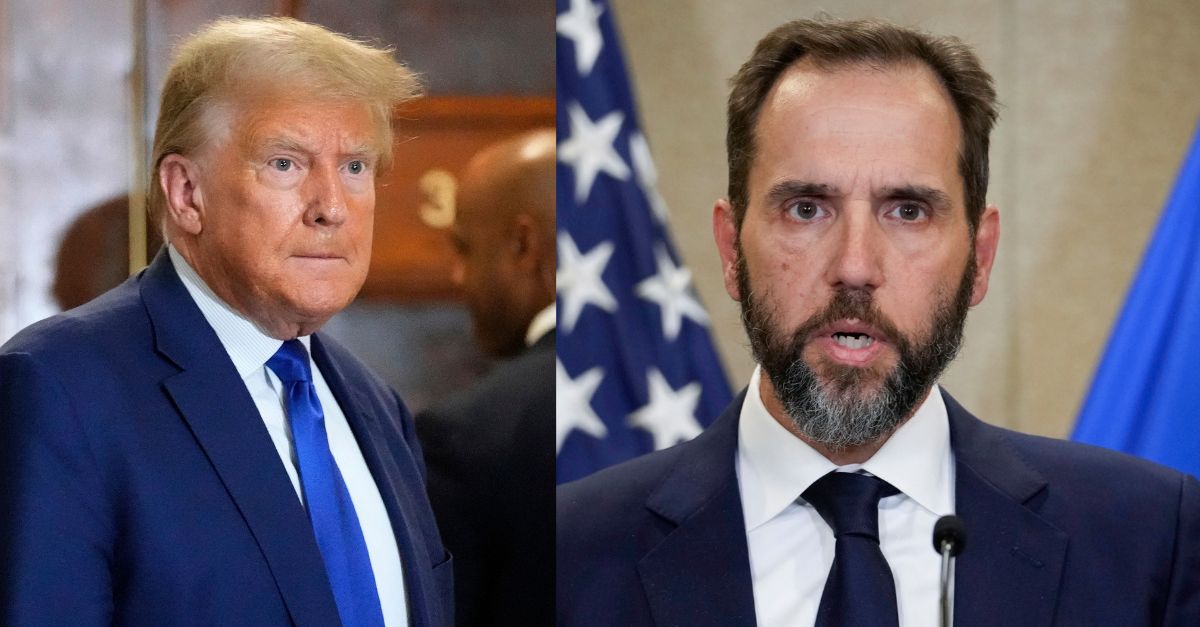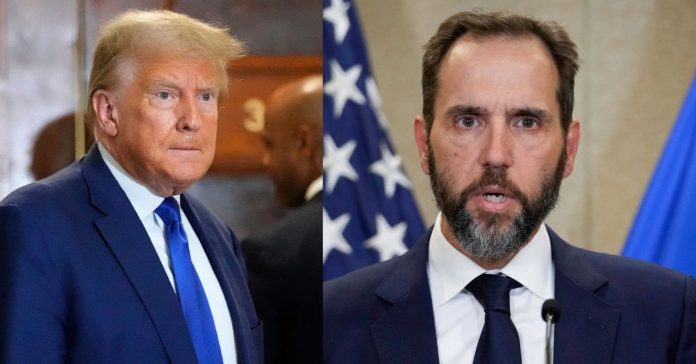
Left: Former President Donald Trump speaks during a break in his civil business fraud trial at New York Supreme Court, Wednesday, Oct. 25, 2023, in New York. (AP Photo: Seth Wenig). Right: Special counsel Jack Smith speaks to the media about an indictment of former President Donald Trump, Tuesday, Aug. 1, 2023, at an office of the Department of Justice in Washington. (AP Photo: J. Scott Applewhite.)
Former President Donald Trump is asking the Supreme Court justices — three of whom were appointed by him — to hold off, at least for now, on hearing arguments about his so-called “absolute immunity” defense against criminal charges he is facing in connection with the Jan. 6 attack on the U.S. Capitol.
Trump is accused of trying to subvert and overturn the results of the 2020 presidential election — efforts that, according to special prosecutor Jack Smith, culminated in the Jan. 6, 2021, siege at the Capitol. On that day, thousands of Trump supporters violently breached the U.S. Capitol building as Congress had begun to certify Joe Biden’s win in the 2020 presidential election.
In a filing Wednesday, Trump’s lawyers John Lauro, D. John Sauer, and Todd Blanche argue that Smith is moving dangerously fast.
“‘This case presents a fundamental question at the heart of our democracy,’ whether a President may be criminally prosecuted for his official acts,” the filing begins (citations omitted). “The ‘paramount public importance’ of that question, calls for it to be resolved in a cautious, deliberative manner — not at breakneck speed.”
In fact, Trump’s lawyers argue, allowing the case to go through the D.C. Circuit will make things easier for the justices when the matter does reach the highest bench in the nation.
“This Court’s ordinary review procedures will allow the D.C. Circuit to address this appeal in the first instance, thus granting this Court the benefit of an appellate court’s prior consideration of these historic topics and performing the traditional winnowing function that this Court has long preferred,” the filing says, noting that the D.C. Circuit “has already granted highly expedited review of President Trump’s appeal,” despite Trump’s opposition to that expedited review, with oral argument set for Jan. 9, 2024.
Lauro, Sauer and Blanche argue that Smith doesn’t have legal standing to appeal directly to the Supreme Court from a district level ruling that was favorable to prosecutors anyway.
“Because the government is not injured by the decision below, this case does not fall within the narrow class of cases where this Court has permitted a prevailing party to appeal from a lower-court victory,” the filing says.
Trump’s lawyers say that Smith “identifies no compelling reason for the extraordinary haste he proposes,” and insist that the special prosecutor is motivated by politics.
“Instead, he vaguely asserts that the ‘public interest’ favors resolution on a dramatically accelerated timetable, to ensure that President Trump may be brought to trial in the next few months. In doing so, he confuses the ‘public interest’ with the manifest partisan interest in ensuring that President Trump will be subjected to a months-long criminal trial at the height of a presidential campaign where he is the leading candidate and the only serious opponent of the current Administration,” the filing says. “The combination of an almost three-year wait to bring this case and the Special Counsel’s current demand for extraordinary expedition, supported by the vaguest of justifications, creates a compelling inference of partisan motivation.”
Lauro, Sauer and Blanche also said that due to Smith’s “insistence on speedy resolution,” Chutkan’s decision “was a hasty analysis of complex issues that overlooks binding authority and commits manifold errors — thus illustrating the hazards of rushed consideration of these questions.”
Trump’s attorneys did not minimize what they argue are the incredibly high stakes of this prosecution and Trump’s defense.
“This appeal presents momentous, historic questions,” the opposition brief says. “An erroneous denial of a claim of presidential immunity from criminal prosecution unquestionably warrants this Court’s review … That does not entail, however, that the Court should take the case before the lower courts complete their review. Every jurisdictional and prudential consideration calls for this Court to allow the appeal to proceed first in the D.C. Circuit.”
“‘Haste makes waste’ is an old adage,” the filing also says (citations omitted). “It has survived because it is right so often.”
Trump has said he isn’t subject to criminal charges because, as president, he had “absolute immunity” from such claims. On Dec. 1, U.S. District Judge Tanya Chutkan disagreed, finding that his four-year service as commander-in-chief did not “bestow on him the divine right of kings to evade the criminal accountability that governs his fellow citizens.”
Trump appealed, and as Law&Crime previously reported, Smith on Dec. 11 went directly to the Supreme Court, asking the justices to grant review of the matter as it was likely headed for the high court regardless of how the D.C. Circuit judges ruled.
“It is of imperative public importance that respondent’s claims of immunity be resolved by this Court and that respondent’s trial proceed as promptly as possible if his claim of immunity is rejected,” Smith wrote. “Respondent’s claims are profoundly mistaken, as the district court held. But only this Court can definitively resolve them. The Court should grant a writ of certiorari before judgment to ensure that it can provide the expeditious resolution that this case warrants.”
Trial in the Jan. 6 case is set for March 4, 2024.
Read Trump’s filing here.
Law&Crime’s Matt Naham contributed to this report.
Have a tip we should know? [email protected]

